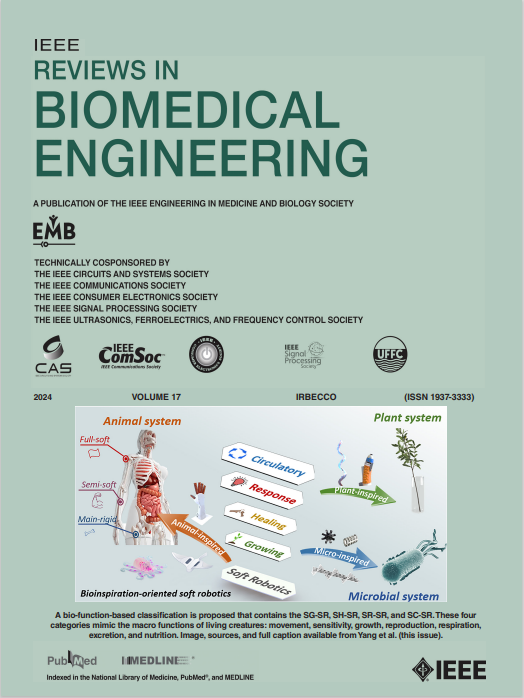Digital Health and Machine Learning Technologies for Blood Glucose Monitoring and Management of Gestational Diabetes
IF 17.2
1区 工程技术
Q1 ENGINEERING, BIOMEDICAL
引用次数: 2
Abstract
Innovations in digital health and machine learning are changing the path of clinical health and care. People from different geographical locations and cultural backgrounds can benefit from the mobility of wearable devices and smartphones to monitor their health ubiquitously. This paper focuses on reviewing the digital health and machine learning technologies used in gestational diabetes – a subtype of diabetes that occurs during pregnancy. This paper reviews sensor technologies used in blood glucose monitoring devices, digital health innovations and machine learning models for gestational diabetes monitoring and management, in clinical and commercial settings, and discusses future directions. Despite one in six mothers having gestational diabetes, digital health applications were underdeveloped, especially the techniques that can be deployed in clinical practice. There is an urgent need to (1) develop clinically interpretable machine learning methods for patients with gestational diabetes, assisting health professionals with treatment, monitoring, and risk stratification before, during and after their pregnancies; (2) adapt and develop clinically-proven devices for patient self-management of health and well-being at home settings (“virtual ward” and virtual consultation), thereby improving clinical outcomes by facilitating timely intervention; and (3) ensure innovations are affordable and sustainable for all women with different socioeconomic backgrounds and clinical resources.用于血糖监测和妊娠糖尿病管理的数字健康和机器学习技术。
数字健康和机器学习领域的创新正在改变临床健康和护理的路径。来自不同地理位置和文化背景的人们可以从可穿戴设备和智能手机的移动性中受益,随时随地监测自己的健康状况。本文重点回顾了用于妊娠糖尿病(一种发生在孕期的糖尿病亚型)的数字健康和机器学习技术。本文回顾了临床和商业环境中用于血糖监测设备的传感器技术、数字健康创新技术以及用于妊娠糖尿病监测和管理的机器学习模型,并讨论了未来的发展方向。尽管每六位母亲中就有一位患有妊娠糖尿病,但数字健康应用,尤其是可在临床实践中应用的技术,却发展不足。目前迫切需要:(1)为妊娠糖尿病患者开发临床可解释的机器学习方法,协助医护人员在妊娠前、妊娠中和妊娠后进行治疗、监测和风险分层;(2)改造和开发经临床验证的设备,用于患者在家庭环境中自我管理健康和福祉("虚拟病房 "和虚拟咨询),从而通过促进及时干预改善临床结果;以及(3)确保创新对不同社会经济背景和临床资源的所有妇女来说都是可负担和可持续的。
本文章由计算机程序翻译,如有差异,请以英文原文为准。
求助全文
约1分钟内获得全文
求助全文
来源期刊

IEEE Reviews in Biomedical Engineering
Engineering-Biomedical Engineering
CiteScore
31.70
自引率
0.60%
发文量
93
期刊介绍:
IEEE Reviews in Biomedical Engineering (RBME) serves as a platform to review the state-of-the-art and trends in the interdisciplinary field of biomedical engineering, which encompasses engineering, life sciences, and medicine. The journal aims to consolidate research and reviews for members of all IEEE societies interested in biomedical engineering. Recognizing the demand for comprehensive reviews among authors of various IEEE journals, RBME addresses this need by receiving, reviewing, and publishing scholarly works under one umbrella. It covers a broad spectrum, from historical to modern developments in biomedical engineering and the integration of technologies from various IEEE societies into the life sciences and medicine.
 求助内容:
求助内容: 应助结果提醒方式:
应助结果提醒方式:


